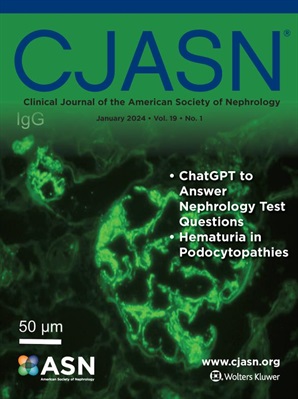降低膳食磷添加剂摄入量对有或无慢性肾病成人矿物质代谢的影响
IF 8.5
1区 医学
Q1 UROLOGY & NEPHROLOGY
Clinical Journal of the American Society of Nephrology
Pub Date : 2025-05-13
DOI:10.2215/cjn.0000000730
引用次数: 0
摘要
背景:过量的磷添加剂摄入会导致与心血管和肾脏疾病相关的磷代谢改变。降低磷添加剂摄入量对患有和不患有慢性肾脏疾病(CKD)的成年人的影响尚不清楚。方法对39例无慢性肾病成人和11例慢性肾病成人进行喂养研究。参与者被喂食磷添加剂增加的饮食两周,然后是低添加剂饮食六周。两种饲粮除磷添加剂含量外无差异。定期收集血液和尿液样本,并分析比较矿物质代谢标志物的随访测量值与基线值。结果非ckd组患者平均(SD)年龄为34(12)岁,其中男性占51%,黑人占36%,平均(SD) eGFR为106(16)ml/min/1.73m2。CKD组平均(SD)年龄为72(6)岁,其中36%为男性,82%为黑人,平均(SD) eGFR为35(13)ml/min/1.73m2。在食用添加剂增强饮食两周后,食用低添加剂饮食六周,两组的24小时尿磷排泄量减少了约30%。在非ckd组中,低添加剂饮食对循环成纤维细胞生长因子23 (FGF23)浓度的影响因种族而异(P相互作用=0.03)-白人成年人的FGF23较基线下降22% (P<0.001),而黑人成年人则没有(P=0.08)。在CKD组中,低添加性饮食6周后,FGF23下降了25% (P<0.001),没有种族差异。完整的甲状旁腺激素(PTH)浓度在CKD参与者中下降了20%,而在非CKD参与者中没有变化。结论6周低磷添加性饮食可降低成人中度CKD患者FGF23和甲状旁腺激素。降低磷添加剂摄入量降低了非CKD白人成年人的FGF23,但对非CKD黑人成年人没有影响。本文章由计算机程序翻译,如有差异,请以英文原文为准。
Effects of Lowering Dietary Phosphorus Additive Intake on Mineral Metabolism in Adults with and without Chronic Kidney Disease.
BACKGROUND
Excess phosphorus additive intake leads to alterations in phosphorus metabolism that are linked to cardiovascular and kidney disease. The effects of lowering phosphorus additive intake in adults with and without chronic kidney disease (CKD) are unclear.
METHODS
We conducted a feeding study in 39 adults without and 11 adults with CKD. Participants were fed a phosphorus additive-enhanced diet for two weeks followed by a low additive diet for six weeks. Both diets were identical except for phosphorus additive content. Blood and urine samples were collected at regular intervals with analyses comparing follow-up measures of mineral metabolism markers to baseline values.
RESULTS
The mean (SD) age of the non-CKD group was 34(12) years, among whom 51% were male, 36% were of Black race, and mean (SD) eGFR was 106(16) ml/min/1.73m2. The mean (SD) age of the CKD group was 72(6) years, among whom 36% were male, 82% were of Black race, and mean (SD) eGFR was 35(13) ml/min/1.73m2. After consuming the additive-enhanced diet for two weeks, consuming the low additive diet for six weeks decreased 24-hour urine phosphorus excretion by ∼30% in both groups. In the non-CKD group, the effect of the low additive diet on circulating fibroblast growth factor 23 (FGF23) concentrations differed by race (Pinteraction=0.03)-FGF23 decreased by 22% from baseline in White adults (P<0.001) but not in Black adults (P=0.08). In the CKD group, FGF23 decreased 25% after six weeks of the low additive diet (P<0.001) with no difference by race. Intact parathyroid hormone (PTH) concentrations decreased 20% in CKD participants and did not change in the non-CKD participants.
CONCLUSION
Six weeks of a low phosphorus additive diet decreased FGF23 and PTH in adults with moderate CKD. Lowering phosphorus additive intake lowered FGF23 in White adults without CKD but had no effect in Black adults without CKD.
求助全文
通过发布文献求助,成功后即可免费获取论文全文。
去求助
来源期刊
CiteScore
12.20
自引率
3.10%
发文量
514
审稿时长
3-6 weeks
期刊介绍:
The Clinical Journal of the American Society of Nephrology strives to establish itself as the foremost authority in communicating and influencing advances in clinical nephrology by (1) swiftly and effectively disseminating pivotal developments in clinical and translational research in nephrology, encompassing innovations in research methods and care delivery; (2) providing context for these advances in relation to future research directions and patient care; and (3) becoming a key voice on issues with potential implications for the clinical practice of nephrology, particularly within the United States. Original manuscript topics cover a range of areas, including Acid/Base and Electrolyte Disorders, Acute Kidney Injury and ICU Nephrology, Chronic Kidney Disease, Clinical Nephrology, Cystic Kidney Disease, Diabetes and the Kidney, Genetics, Geriatric and Palliative Nephrology, Glomerular and Tubulointerstitial Diseases, Hypertension, Maintenance Dialysis, Mineral Metabolism, Nephrolithiasis, and Transplantation.

 求助内容:
求助内容: 应助结果提醒方式:
应助结果提醒方式:


